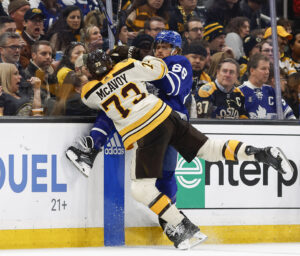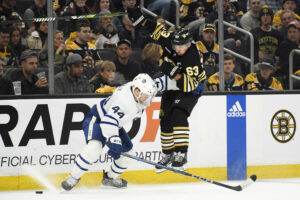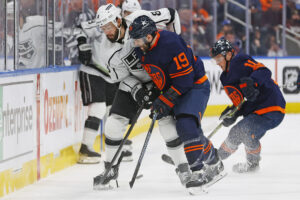We’re up to Part 3 of our four-part series regarding the broken systems around NHL Playoff Officiating and player safety. In part 1, we covered a series of head hits and the many layers of failure surrounding them. In Part 2, we covered a key play in the opening round of the playoffs which badly injured a player and, once again, saw systemic failure, as once again multiple layers failed badly.
NHL Playoff Officiating, Player Safety and a Failure of Accountability
The San Jose Sharks game-winning overtime goal in Game 3 of the Western Conference Final was the direct result of an uncalled hand pass. On this point, there is no disagreement between myself and everyone else.
It was an egregious miss by the officials because it led directly to a goal. And really, it was egregious ONLY because it led to a goal. If it hadn’t led to the game-winning goal, no one would have remembered it. But it wasn’t the only egregious miss which led to a goal in the game.
I counted four egregious ‘non-calls’ over the course in the game, the hand pass and three others. For the record they are:
1. Delay of game by the Blues (David Perron, in period two)
2. Colton Parayko slash on Micheal Haley (NBC announcer Pierre McGuire invoked the lumberjack legend of Paul Bunyan to describe the chop, in period two)
3. Head hit to Justin Braun by Sammy Blais (possibly deserving a major, in period three)
4. Hand pass (by Timo Meier, in overtime)
Missed Call Impact
One of these missed calls enabled the St. Louis Blues a goal (scoring while Parayko would have been in the penalty box) and likely a second (the Blues drew a penalty shortly after Parayko would have left the penalty box). It also denied the Sharks between six and nine minutes of power-play time. The slash and head hit resulted in Sharks players injured to the point they went straight to the bench, leaving parts of their gear on the ice (one player didn’t return to the game and missed the next game, too). On the delay of game, all four officials got together only to get it wrong.
Did the officials really miss all these calls? There is a reason to be a skeptic. The real story is this. The officials decided to ignore pretty much everything all game long, calling only two minor penalties (one on each team). In hockey parlance, they swallowed their whistles. There are reasons officials swallow their whistles and they are often praised for doing this. But it also comes with risks.
One More Missed Call
Just two seconds before the hand-pass, the officials let an obvious penalty go uncalled. Blues defenceman Jay Bouwmeester tripped Sharks forward Timo Meier. It is easily seen on the video replays. The trip occurs two seconds before the hand pass and it is why Meier is on his knees at the time of the hand-pass – he was getting back up at the time. The trip led directly to the hand pass. If Meier isn’t on his knees, there’s no hand pass.
It’d be nice if someone in the NHL media pointed out the trip, but if anyone did, I missed it. It was yet another case where the officials either missed or (more likely) ignored an obvious call. It was also a case of the media missing an important aspect of the play and a clue to the real issue.
There was no expectation the officials would call the trip because they hadn’t called much of anything all game long, let alone a mundane trip like this one. For the exact same reason, there was no expectation the officials would call a mundane hand pass a moment later. In this case, mundane turned into the game-winning goal.
There is a scenario that makes sense. The officials notice the trip and think “I’m not calling that.” A moment later, the officials notice the hand pass and think “I’m not calling that, either.” It’s harder to believe the officials missed both plays as both were obvious.
Whistles Swallowed
NHL commissioner Gary Bettman spoke of his “head exploding” over the call, but in all candor, the NHL has long accepted games where officials swallow their whistles; where they “let the players play.” The NHL wants it both ways. They’re fine with a game featuring few whistles and egregious penalties going uncalled, but not willing to accept the consequences of an uncalled play at the end. It’s hypocritical. At multiple levels, the accountability factor is, yet again, completely absent.
By focusing only on the final play, the real story is missed.
In the end, it is a simple question. If officials are ignoring obvious calls on plays which injure players (including a headshot worthy of a major penalty), why expect them to enforce a low-level rule surrounding a hand pass?
The Impact and Real Question
This isn’t an attempt to defend the officials, but it is presenting a fuller picture. The officials were consistent (isn’t this what we ask of them most often?). They let almost everything go, all game long. Their non-calls had an impact on the game, all game long. One can be comfortable on this point; the Blues benefited from three egregiously bad non-calls during regulation and it affected the score. The Sharks benefited from the one egregiously bad non-call on the overtime goal and it too affected the score.
The impact of the officiating on the end result is anything but clear. The NHL doesn’t help anyone by looking at one play and putting it all on that moment (not even looking back just two seconds and noticing another missed call which directly effected the play). Nor does the media help when it focuses so tightly on this one piece of officiating while ignoring the real story. In this case, it is an age-old question: should NHL officials swallow their whistles?
Main Photo:
Embed from Getty Images






